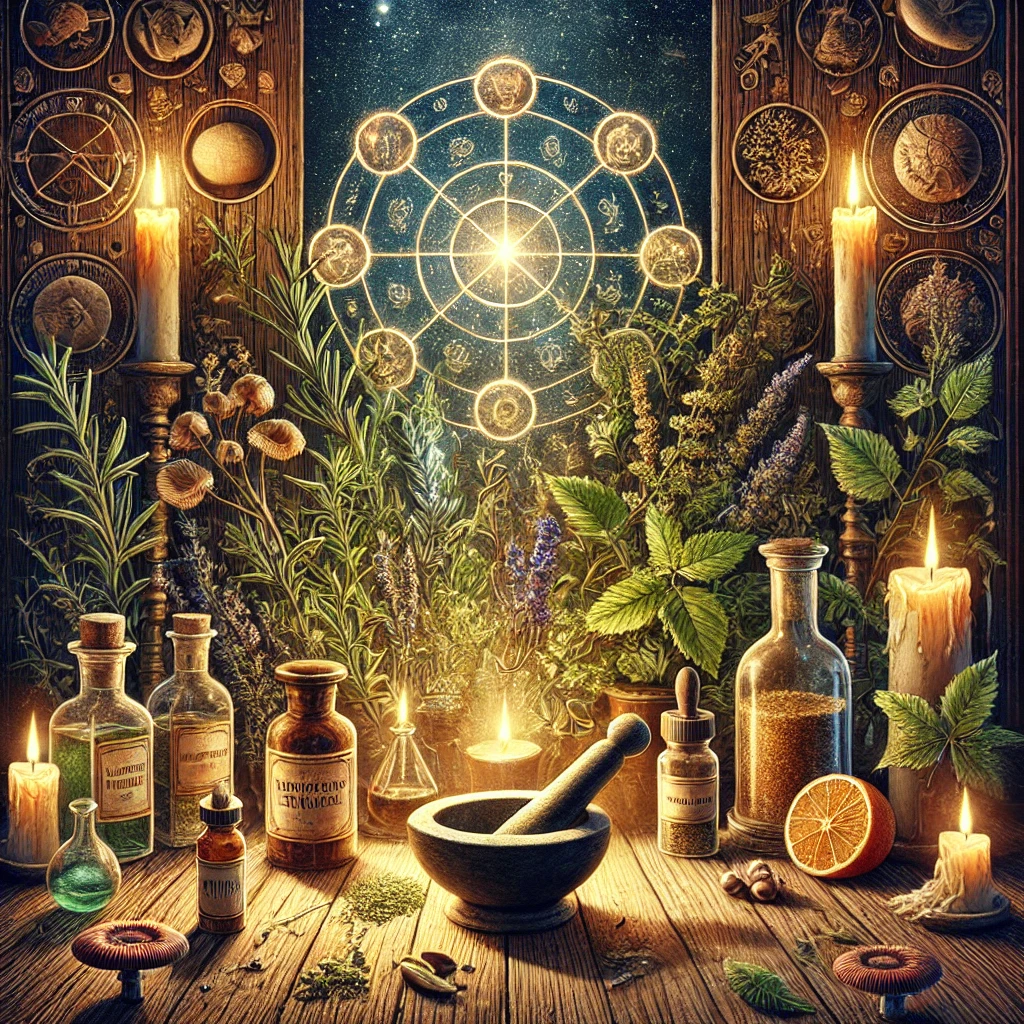Definition
Alchemical Herbalism is a transformative approach to herbal medicine that integrates traditional plant-based healing with the spiritual and energetic principles of alchemy. Rooted in ancient Hermetic philosophy, Alchemical Herbalism views plants not only as physical remedies but as living intelligences carrying spiritual and energetic properties. This practice seeks to extract and harmonize the full essence of herbs—physical, energetic, and spiritual—to create powerful medicines that align with the body’s natural rhythms and the cycles of nature.
Origins and Philosophy
Alchemical Herbalism is deeply influenced by the teachings of classical alchemy, particularly the Hermetic tradition, which emphasizes the relationship between nature, the cosmos, and the human body. The guiding principle of alchemy is the idea of transformation—both of substances and of the self. In this context, herbal alchemy is not just about creating potent remedies but about engaging in a spiritual practice that deepens one’s connection to nature and consciousness.
Key Alchemical Concepts in Herbalism
- The Three Principles (Tria Prima)
- Salt (Body) – The physical structure of the plant, representing stability and form.
- Sulfur (Soul) – The essential oils and volatile compounds, symbolizing the plant’s energetic and healing properties.
- Mercury (Spirit) – The alcohol and water-soluble constituents, representing the plant’s ability to move between physical and spiritual realms.
- The Four Elements
- Earth – Grounding, stabilizing, and nourishing properties in herbs.
- Water – Emotional and intuitive healing aspects, as well as fluid balance.
- Air – Mental clarity, movement, and communication-enhancing properties.
- Fire – Transformation, metabolism, and energetic activation.
- Planetary Correspondences
Alchemical herbalists assign herbs to planetary influences, believing that each plant resonates with a celestial body. For example:- Sun herbs (e.g., St. John’s Wort) uplift and energize.
- Moon herbs (e.g., Mugwort) enhance intuition and emotional healing.
- Mars herbs (e.g., Nettle) stimulate circulation and fortify strength.
The Process of Alchemical Herbalism
Alchemical Herbalism involves a unique approach to preparing and using medicinal herbs. The goal is to extract and reintegrate all aspects of a plant, creating a spagyric medicine—a form of herbal preparation that maintains the plant’s full spectrum of healing properties.
The Three Steps of Spagyric Medicine
- Separation (Solve) – The plant is divided into its core components: essential oils, minerals, and extracts.
- Purification (Cohobation) – Each component is purified and refined through various processes such as fermentation, distillation, or calcination (burning plant material to extract minerals).
- Recombination (Coagula) – The purified elements are recombined, creating a powerful herbal remedy that contains the plant’s full essence—physical, energetic, and spiritual.
Benefits of Alchemical Herbalism
1. Holistic Healing
Unlike conventional herbalism, which focuses primarily on physical health, Alchemical Herbalism aims to heal on multiple levels—physical, emotional, mental, and spiritual.
2. Enhanced Potency
By refining and concentrating the vital elements of a plant, alchemical preparations often have a stronger effect than standard herbal extracts.
3. Personal and Spiritual Growth
Engaging with plants in an alchemical way fosters personal transformation, deepens intuition, and strengthens the connection between the individual and nature.
4. Alignment with Natural Cycles
Alchemical herbalists work in harmony with astrological cycles, lunar phases, and seasonal shifts, ensuring that herbal medicines are created at optimal energetic times.
Commonly Used Herbs in Alchemical Herbalism
| Herb | Planetary Influence | Key Benefits |
|---|---|---|
| Rosemary | Sun | Mental clarity, circulation, protection |
| Mugwort | Moon | Intuition, dreams, psychic activation |
| Nettle | Mars | Vitality, blood purification, strength |
| Lemon Balm | Mercury | Nervous system balance, mood upliftment |
| Reishi Mushroom | Saturn | Longevity, grounding, spiritual wisdom |
| Tulsi (Holy Basil) | Jupiter | Expansion, divine connection, emotional balance |
Methods of Using Alchemical Herbalism
- Spagyric Tinctures – Herbal tinctures made using the full spagyric process.
- Alchemical Elixirs – Potent herbal blends infused with planetary influences and energetic balancing techniques.
- Herbal Incense & Oils – Used in ritual and energetic healing.
- Astrological Herbalism – Selecting herbs based on planetary alignments for optimal healing.
Precautions & Considerations
- Spagyric remedies are highly concentrated; start with small doses.
- Alchemical herbalism is a deep practice; learning from an experienced practitioner is beneficial.
- Some herbs have potent effects and may interact with medications—always consult a healthcare professional before use.
Conclusion
Alchemical Herbalism is a profound fusion of herbal medicine, spiritual wisdom, and alchemical philosophy. It not only enhances the potency of plant-based healing but also fosters personal transformation and alignment with nature’s rhythms. By working with herbs through this ancient lens, practitioners can unlock deeper healing potential, greater awareness, and a harmonious connection with the living world.

